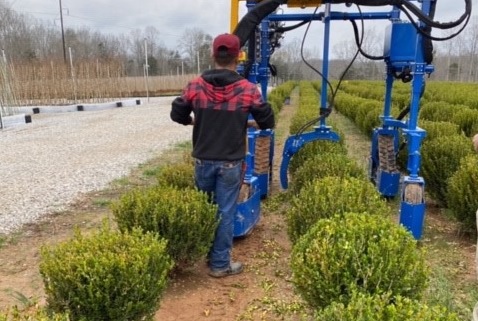
Project Team Includes Research and Extension Faculty from Six Institutions
KNOXVILLE, Tenn. – Over the next year, the University of Tennessee Institute of Agriculture will lead a team of scientists from six partnering institutions to help nursery growers transition to labor-saving automation and related technologies.
Amy Fulcher and Natalie Bumgarner, associate professors in the UT Department of Plant Sciences, are part of a transdisciplinary team that includes economists, engineers, behavioral scientists and commercial and consumer horticulture faculty. The LEAP (Labor, Efficiency, Automation and Production) Team will work with nursery owners across the U.S. to better understand their labor issues, identify the greatest labor constraints and opportunities within nursery systems and determine the role automation and related technologies will play in addressing the labor shortage.
For the past ten years, Fulcher and other LEAP Team members have been involved in the development of intelligent pesticide sprayers for the nursey industry that utilizes sensors and variable-rate nozzles to adjust the application to each plant’s physical characteristics. Those efforts led to a commercialized sprayer and are estimated to save growers more than $200 per acre in pesticide costs. The new effort, which includes members of this successful project, received a $50,000 planning grant from the USDA National Institute of Food and Agriculture’s Specialty Crops Research Initiative and is expected to conduct listening sessions and a survey to identify and prioritize yet-to-be developed automated technologies in nursery production systems.
Margarita Velandia, professor, and Alicia Rihn, assistant professor, both from the UT Department of Agricultural and Resource Economics, recently joined the LEAP Team and will provide critical production and consumer economics expertise.
“Nearly 80% of nursery producers identify labor shortages as a threat to the future of their industry,” states Fulcher. “Automation offers a largely untapped opportunity to permanently address labor scarcity. Our team will identify important motivators and barriers to adopting automated practices in order to determine the best methods to construct and convey outreach information. Ultimately, we hope to help facilitate the transition to automated technology for the nursery industry as a whole,” continues the extension specialist and researcher.
Currently, only 17.5% of the most common nursery tasks are automated. Nationwide, nursery production contributes more than $4.2 billion to the economy and there are more than 800 nurseries in Tennessee alone. Automated technology has the potential to help growers increase profits and product uniformity, decrease costs and avoid the pitfalls of labor shortages as well. The research team is comprised of scientists from six institutions: the University of Tennessee, USDA ARS, North Carolina State University, University of Florida, Texas A&M University, and Oregon State University.
Through its land-grant mission of research, teaching and extension, the University of Tennessee Institute of Agriculture touches lives and provides Real. Life. Solutions. utia.tennessee.edu.